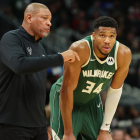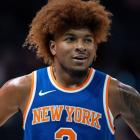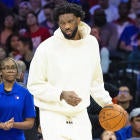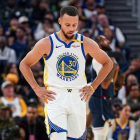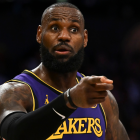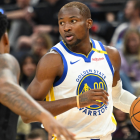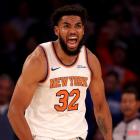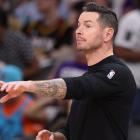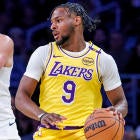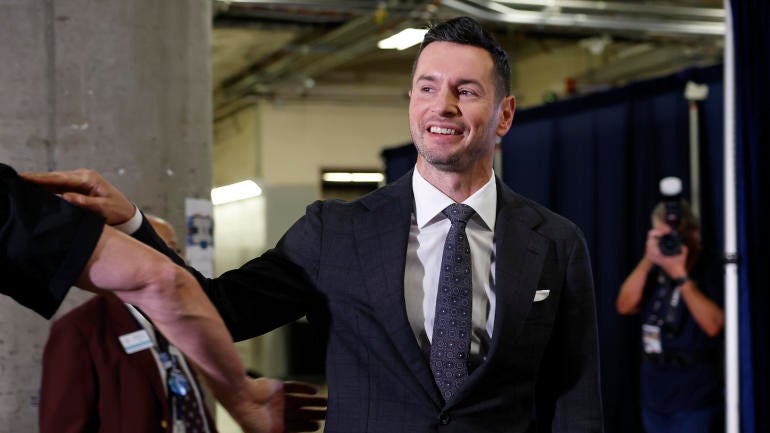
Let's start with some math: Five teams have won an NBA championship since 2020, the Los Angeles Lakers are one of them, yet they are now on their third coach over that time span with the hiring of JJ Redick.
Frank Vogel won a title, then got fired. Darvin Ham made the conference finals, then got fired. Now Redick parachutes in as the hot-shot hire as we hear ridiculous comparisons to Pat Riley and Steve Kerr and Eric Spoelstra. It's almost too absurd to even laugh.
Yeah, we get it. Redick is a smart guy. He looks and sounds sharp. The Riley comp, if you really want to be this lazy, lands in your lap from a headshot standpoint, as does Kerr because of their similar player profiles and broadcasting backgrounds.
This isn't to say Redick won't be a successful coach. Or hell, even an all-time great one. But if he is, like those names above, he'll be the exception. Not the rule. The rule is that almost all NBA coaches are tied almost directly to their rosters. They might get a little more or less out of the group they've been granted, but not much. The Lakers, who have hired and fired seven coaches since Phil Jackson left in 2012, aren't alone in always thinking they've managed to identify the exception.
To run down the list of coaches that were supposed to make a significant difference only to fare, barring a roster improvement, much the same as their predecessor would take forever, but let's look at a few recent examples.
The Hawks hired Quin Snyder to replace Nate McMillan -- who, it's worth noting, was largely the beneficiary of circumstance himself as Atlanta got healthy in 2021 just as he was replacing Lloyd Pierce and then went on to make a fluky, matchup-friendly playoff run -- when it turned out that McMillan, with a few more years of evidence, wasn't actually able to lift a Hawks roster that can't defend and is too reliant on the individual creation of an otherwise stagnant Trae Young.
Snyder came in with a modernized plan to play faster and shoot more 3s and everyone bought into the time-honored illusion that a glitzy big-name coach could achieve a different result with the same team. Wrong. Atlanta got worse.
In Milwaukee, Doc Rivers was brought in to replace Adrian Griffin, who was brought in to replace Mike Budenholzer, who won a championship two years before his dismissal. Griffin was 30-13 when he got canned and the Bucks finished the regular season 17-19 under Rivers.
One stop on the coaching carousel earlier. Rivers was also tabbed as the guy to improve on what the Sixers were able to do under Brett Brown, who never made it past the second round. Two coaches later, the Sixers still haven't made a conference final.
Chauncey Billups supposedly spoke the same point guard language as Damian Lillard, who now plays for Rivers. Steve Nash had the same former-player clout and quickly became something of a joke.
Monty Williams was the guy to lead Detroit into the future, and he lasted all of one year. The Pistons are now paying him $65 million NOT to coach the team anymore. Funny how Williams was a great coach in Phoenix and a terrible one in Detroit.
It's almost all circumstantial. Look at Jason Kidd, who was as mocked as any recent coach for some of his tactics in previous stops, but now, in principle, just got the same extension that McMillan did in Atlanta as a coach who just happened to be on the sideline when the stars aligned. Kidd is not a better coach than Rick Carlisle, who also isn't as valuable as this conference-finals run the Pacers just made would indicate.
Carlisle's Pacers got the Bucks without the services of Giannis Anteokounmpo and, for two of the final three games, Damian Lillard in the first round, and then a ravaged Knicks team that was one step from pulling people out of the stands to play in the second round.
Meanwhile, Kidd got Kyrie Irving as a model citizen, something Nash never enjoyed, and massive additions at the trade deadline. When Kidd makes the Finals with largely the same Dallas team that Carlisle was never able to lead that far, we can talk.
Until then, if the team changes for the better, and the coach, in turn, magically gets better, do the math. At this time last year, Joe Mazzulla was supposedly a bad coach. Did he suddenly become a championship one because he figured out when to call timeouts or because he got Jrue Holiday and Kristaps Porzingis?
Was Nick Nurse that much better than Dwane Casey, who literally won Coach of the Year the summer he got fired, or did he just stumble into Kawhi Leonard?
Is Chris Finch, the guy who put Rudy Gobert on the court in an obvious switch situation vs. Luka Doncic to lose a conference-final game, some kind of savior or did he happen to be in the seat when Gobert came in to guarantee a top-flight defense and Anthony Edwards evolved into a superstar?
Did the Knicks become a No. 2 seed because they're "A Thibs team!" or because they got Jalen Brunson? Before you answer, everyone realizes that Tom Thibodeau is a good coach. That's not the point. The point is he went 78-76 over two seasons before he got Brunson and Josh Hart and Isaiah Hartenstein and Donte DiVincenzo and finally OG Anunoby.
This isn't meant to take anything away from Mazzulla or Nurse or Finch or Thibodeau or any other NBA coach who isn't Kerr or Spoesltra or Gregg Popovic. It goes without saying that they're all incredibly smart, accomplished and capable basketball people. It's just an indisputable fact that most of them, certainly over time, will not deliver a bottom-line result that deviates an appreciable distance from the realistic standard of the roster with which they are working.
Result, by the way, is the operative term there. Coaches impact players and teams in all sorts of ways. It's about relationships and communication behind closed doors. In fact, Redick told Taylor Rooks in 2022 that he looks at coaching "as a way to help" as he alluded to the interpersonal opportunities such a position can afford.
"I had so many people help me in my career," Redick said. "And not just head coaches; assistant coaches, player development people, and they have such a valuable place in my heart and in my life. And I'd love to be one of those people someday."
What Redick is talking about, the relationships that are cultivated through coaching, the impact one person can have on another, which is a very rewarding and fulfilling thing, is great and all, but that's not what gets head coaches hired or fired. This isn't high school where the job description includes the molding of young men. Redick isn't getting a $1,500 coaching stipend while also teaching third-period science.
No, he's reportedly getting north of $30 million over four years to do one thing: deliver results. Wins and losses. That's it. So let's keep it right there: The Lakers won 47 games last year and lost in the first round. You can point to Kerr, who almost miraculously took the Warriors from 51 wins and a first-round defeat in their final season under Mark Jackson to 67 wins and a championship in his first season at the helm (with largely the same roster), but again, that is a once-in-a-lifetime exception.
That Warriors team was being egregiously under-coached by Jackson. One could argue there has never been a more ripe basketball situation for a new coach to walk in and become an immediate hero with an entire offensive overhaul begging to be made.
Tell me, on a macro level, what is Redick going to do so differently than Ham? And we're not talking about Taurean Prince minutes. We're talking about things that will truly change the fortunes of the team. Redick says LeBron is going to play off the ball more and Anthony Davis will be utilized in a featured way?
Wow. Stop traffic. We've got some revolutionary ideas here! The Lakers have been trying to play LeBron off the ball for years. It's why they brought in Russell Westbrook for crying out loud. You know what the key to playing LeBron off the ball more is? Finding someone better than D'Angelo Russell to play on the ball. Not hiring JJ Redick.
Indeed, coaches aren't hired and fired at such an absurd frequency because there's really much difference from one to the next. The press releases will talk about commanding respect of the locker room and all that jazz, but in truth, coaches are just the easiest variable to change when things aren't going as well as you'd hoped.
You can't just up and change players. There are contracts. And a salary cap. But coaches can always be swapped in and out, and as long as that's the case, teams like the Lakers will continue to package their "activity" on the bench and try to sell it as actual progress on the court.
It's the front-office equivalent of that guy who stands at half court dribbling the air out of the ball, wowing the less discerning fan with an array of fancy maneuvers meant to distract you from the fact that in all this circle spinning, he hasn't actually moved any closer to the goal.
In all likelihood, the Lakers are not any closer to their goal of winning a championship with Redick than they were with Ham. And they certainly weren't any closer with Ham than they were with Vogel, who actually won the whole thing because he had a two-way roster with multiple playmakers and size and defensive versatility (and because Anthony Davis got to shoot midrange jumpers in a high-school gym, but that's beside the point).
So here's what's going to happen: The Lakers are either going to change their roster significantly enough to actually change their on-court fortunes, in which case Redick, and the oh-so-smart people who hired him, will be showered with praise, or they won't improve the roster, and LeBron and Davis won't be as durable as they were last year, and Redick suddenly won't look so shiny.
At which point, we'll all start talking about who's going to replace him.
Looking for more NBA coverage? John Gonzalez, Bill Reiter, Ashley Nicole Moss and special guests dive deep into the league's biggest storylines daily on the Beyond the Arc podcast.









